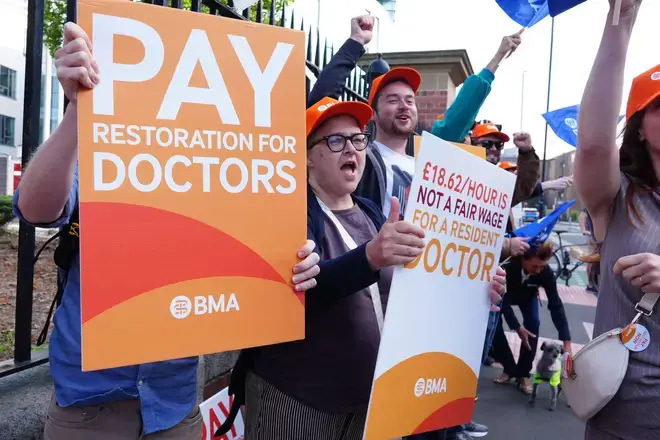The British Medical Association has rejected NHS England reports that less than a third of resident doctors joined strike action last week.
According to an early analysis of management information collected by NHS England, the number that took part in the five-day walkout was down by 7.5% (1,243) on the previous round of industrial action in July last year.
The British Medical Association has rejected this, saying complex work schedules and doctors taking leave make this information “almost impossible to know”.
NHS England said it maintained care for an estimated 10,000 more patients during the latest doctors’ strike compared with last year’s, and 93% of planned operations, tests and procedures went ahead.
In previous walkouts, the majority of non-urgent care was postponed.
Health Secretary Wes Streeting said: “A majority of resident doctors didn’t vote for strike action and data shows that less than a third of residents took part.
“I want to thank those resident doctors who went to work for their commitment to their patients and to our shared mission to rebuild the NHS.”
He said it is time to “move past the cycle of disruption”.
He added: “I want to end this unnecessary dispute and I will be urging the BMA to work with the Government in good faith in our shared endeavour to improve the working lives of resident doctors, rather than pursuing more reckless strike action.”
Streeting – We are doing everything we can to minimise patient harm during strike
The BMA said it recognised the efforts that senior doctors and healthcare workers made during the strike to provide care to patients, but it disputed the figure set out by the NHS.
It said: “NHS England’s claim that the majority of England’s 77,000 resident doctors chose to ‘join the NHS-wide effort to keep the services open’ requires a huge stretch of the imagination, given it is almost impossible to know the exact number of residents working on any given day because of complex work patterns, on-call schedules and the strike spread across a weekend.
“Added to that, in July many doctors are using up their remaining annual leave before their new posts start and would therefore not show up as striking.
“We look forward to seeing hard and fast data on NHS England’s claim.
“The strike could have been averted, as could any future ones, if Mr Streeting had come, and will come, to the table with a credible offer that resident doctors in England can accept.”
NHS chief executive Sir James Mackey noted care was still disrupted for thousands of people and said a repeat of strike action will be “unacceptable”.
“I would urge the resident doctors committee to get back to the negotiating table and work with us and the Government on the meaningful improvements we can make to resident doctors’ working lives.”
NHS Providers, which represents hospital trusts, said the walkout took a toll and trusts are concerned about potential wider industrial action in the health service.
Saffron Cordery, NHS Providers deputy chief executive, said: “This dispute can’t drag on.
“The union says resident doctors want this to be their last strike. With talks due to resume, let’s hope so. Bringing disruptive strikes – where the only people being punished are patients – to an end must be a priority.
“We’re concerned, as trusts worked hard to minimise disruption and to keep patients safe during the resident doctors’ strike, by the threat of wider industrial action in the NHS.”


